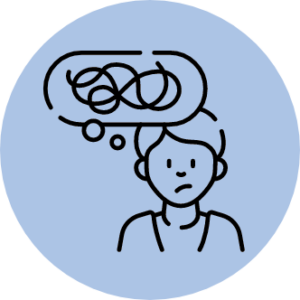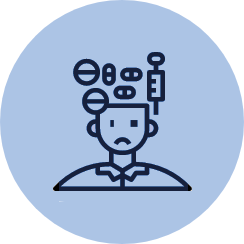Intensive Outpatient Program in Maryland

Our IOP is built on our foundational mission: to inspire hope, increase awareness, and further the health and well-being of our clients through evidence-based practice. We’re more than just a treatment facility; we’re a community dedicated to providing culturally competent, holistic, wellness-focused services promoting social-emotional development and sobriety.
With mental health and substance use disorders affecting nearly 1 in 5 adults in the U.S., according to the National Institute of Mental Health, the need for accessible, intensive outpatient treatment has never been greater. Through our IOP, we aim to fill this need, offering a robust, supportive environment for those seeking to regain control of their lives.

What is an Intensive Outpatient Program (IOP)?
An Intensive Outpatient Program (IOP) is a treatment program used to address addictions, depression, or other dependencies that do not require detox services or around-the-clock supervision. IOPs enable individuals to continue with their normal daily activities, such as work, school, or family responsibilities, while still receiving the help they need.
For addiction treatment, an IOP typically involves group therapy sessions that focus on relapse prevention, family systems, and the development of communication skills and social networks that support sobriety. The goal is to provide patients with the tools and resources needed to maintain abstinence from substance use in the long term.
Dual Diagnosis Treatment in an Intensive Outpatient Treatment
An IOP typically includes services such as individual counseling, group therapy, medication management, psychoeducation, and relapse prevention planning. It offers a higher level of care than standard outpatient treatment, typically involving multiple treatment sessions per week, but it is less intensive than residential or inpatient treatment.
It’s important to note that an IOP is a step down from a residential program or partial hospitalization program (PHP), but it still provides a structured therapeutic environment. It’s designed for individuals who are motivated to recover but need more support than traditional outpatient therapy can provide. It’s also ideal for those transitioning from inpatient care to independent living.

Dual Diagnosis Treatment in an Intensive Outpatient Treatment
An IOP typically includes services such as individual counseling, group therapy, medication management, psychoeducation, and relapse prevention planning. It offers a higher level of care than standard outpatient treatment, typically involving multiple treatment sessions per week, but it is less intensive than residential or inpatient treatment.
It’s important to note that an IOP is a step down from a residential program or partial hospitalization program (PHP), but it still provides a structured therapeutic environment. It’s designed for individuals who are motivated to recover but need more support than traditional outpatient therapy can provide. It’s also ideal for those transitioning from inpatient care to independent living.
What Can I Expect in IOP?
 In the Intensive Outpatient Program (IOP) at Elevated Wellness Clinic, you can expect a structured yet flexible approach to addiction treatment that allows you to maintain your day-to-day activities while receiving the care you need. The program typically runs for 3-5 days weekly, with each session lasting approximately 2.5 hours, amounting to around 7.5 to 12.5 hours of treatment per week.
In the Intensive Outpatient Program (IOP) at Elevated Wellness Clinic, you can expect a structured yet flexible approach to addiction treatment that allows you to maintain your day-to-day activities while receiving the care you need. The program typically runs for 3-5 days weekly, with each session lasting approximately 2.5 hours, amounting to around 7.5 to 12.5 hours of treatment per week.
A typical day in the IOP may start with an individual therapy session, where you’ll have the opportunity to delve into personal issues and develop strategies to combat addictive behaviors. This is followed by group therapy sessions, which are instrumental in building a supportive community, learning from others’ experiences, and practicing new skills.
A significant portion of your time will be spent on different types of therapy, both individual and group-based. These sessions focus on various aspects, such as cognitive-behavioral therapy, dialectical behavior therapy, family dynamics, and trauma-informed care. You can expect to spend about 50-60% of your time in these therapeutic sessions.
The next substantial segment of the program involves addiction education, taking up approximately 20-30% of your time. This includes learning about the nature of addiction, understanding triggers, developing coping mechanisms, and exploring relapse prevention techniques.
The rest of the time, about 10-20%, is dedicated to life skills training and other holistic services. This could involve learning stress management techniques, improving communication and problem-solving skills, practicing mindfulness, or participating in recreational therapies like art or yoga.
In addition to the scheduled sessions, the IOP at Elevated Wellness Clinic includes ongoing evaluation and testing, psychiatry/medication management, essential life skills coaching, and a family program. All these are tailored to meet your individual needs, ensuring you receive comprehensive care that addresses all aspects of your recovery journey.
ASAM Criteria Assessment, a standardized tool for determining the appropriate level of care for a patient, is also part of the program. This assessment helps to create an individualized treatment plan that includes both individual and group substance abuse therapy.
Remember, the IOP is not a one-size-fits-all solution; it’s flexible and can be adjusted based on your progress and specific needs. The ultimate goal is to provide you with the tools, skills, and support necessary to achieve long-term sobriety and wellness.
This is a one-on-one session with a therapist, focusing on personal challenges and goals. It provides a safe environment to openly discuss issues and develop coping strategies.
In these sessions, individuals come together under the guidance of a professional to share experiences and learn from each other. It helps build a support network and enhances communication and socialization skills.
Addiction often affects the entire family, not just the individual. Family therapy involves sessions with family members to address these impacts, improve communication within the family, and foster a supportive home environment for recovery.
Cognitive Behavioral Therapy focuses on identifying and correcting harmful thought patterns that lead to addictive behaviors. It equips individuals with practical strategies to manage triggers and prevent relapse.
Dialectical Behavioral Therapy is particularly effective for individuals struggling with emotional regulation. It teaches skills in four key areas: mindfulness, distress tolerance, emotional regulation, and interpersonal effectiveness.
This is a counseling method that helps individuals resolve ambivalent feelings and insecurities to find the internal motivation to change their behavior. It’s particularly useful in treating substance abuse.
Due to the rise of digital technology in healthcare, telehealth treatment has become an increasingly common option. Telehealth allows individuals to participate in treatment sessions remotely via video conferencing. This can be beneficial for those who may have difficulty attending in-person sessions due to geographical distance, physical disability, or other barriers. It ensures that everyone has access to necessary care, no matter where they are.
What Disorders Can Be Treated in an IOP?
Intensive Outpatient Programs (IOPs) are designed to treat a wide range of disorders. Here’s how they can address specific disorders and issues treated at Elevated Wellness:
Substance Abuse Disorders
IOPs are often used in the treatment of substance abuse disorders, including alcoholism, drug addiction, and more. Treatment typically includes group and individual therapy, education about the nature of addiction, coping mechanisms, relapse prevention, and sometimes medication management.
Mental Health Disorders
Many IOPs are equipped to treat various mental health disorders such as depression, anxiety, bipolar disorder, post-traumatic stress disorder (PTSD), and others. The program might include cognitive-behavioral therapy, dialectical behavioral therapy, and other therapeutic approaches, along with medication management if needed.
Grief and Bereavement Issues
Grief and loss can be very challenging to navigate. IOPs can provide support through this process with individual and group therapy, helping individuals understand and cope with their feelings, and find healthy ways to move forward.
Sexual Orientation and Gender Issues
IOPs can offer a safe, supportive environment for individuals dealing with issues related to sexual orientation or gender identity. This could include coming out, transitioning, dealing with discrimination or family rejection, and more. Therapy can help individuals develop self-acceptance, resilience, and coping strategies.
General Behavior Problems
For individuals struggling with behavior issues like anger management, impulse control, or self-harm tendencies, an IOP can provide structured support. This might involve cognitive-behavioral therapy to identify triggers and develop healthier responses, along with other therapeutic interventions.
In all cases, the goal of an IOP is to provide intensive, holistic care that meets the individual’s specific needs and promotes recovery and well-being. It’s important to remember that every person’s journey is unique, and treatment should be tailored to their unique situation and needs. Always consult with a healthcare provider to determine the best course of treatment.
What are the Benefits of IOP?
IOPs bridge the gap between residential treatment and traditional outpatient services, allowing individuals to continue with their daily routines, such as work or school while receiving treatment.
IOPs provide a holistic approach to treatment, including individual counseling sessions, group therapy, life skills classes, and support groups. This integrated approach addresses various aspects of an individual’s well-being.
IOPs help individuals build new support systems. The group therapy sessions, facilitated by a counselor, allow individuals to connect with others who are going through similar experiences, fostering a sense of community and mutual support.
IOPs encourage individuals to develop healthy habits and coping strategies that aid in maintaining long-term recovery. These can include stress management techniques, communication skills, and problem-solving strategies.
According to a study published by the National Institutes of Health, IOPs are an important part of the continuum of care for alcohol and drug use disorders and are as effective as inpatient treatment for most individuals.
IOPs offer a more affordable and accessible option compared to residential treatment programs. They allow for addiction treatment without the need for an overnight stay at a treatment center.

In conclusion, IOPs provide a flexible, comprehensive, and effective approach to treatment that can be tailored to meet the specific needs of each individual. Always consult with a healthcare provider to determine the best course of treatment.
What’s the Difference Between an IOP and Other Treatment Programs?
Residential vs. IOP
Residential treatment programs require individuals to live at the treatment facility full-time. This type of program provides around-the-clock care and is typically used for more severe cases. The main difference between a residential treatment program and an IOP is that in an IOP, patients can continue to live at home and maintain their regular responsibilities, such as work, school, and family obligations.
Partial Care Program vs. IOP
A partial care program, also known as a day program, offers a similar level of care to a residential program but allows patients to return home at night. These programs typically run five days a week and last for several hours each day. On the other hand, IOPs are less time-intensive and offer more flexibility, making them a good option for those who need a high level of care but also need to maintain their daily routines.
Outpatient Program vs. IOP
Standard outpatient programs are the least intensive option. They typically involve one or two sessions per week and do not require patients to spend a significant amount of time at the treatment facility. An IOP, however, requires a greater time commitment (typically several sessions per week), providing a higher level of care without the need for overnight stays. Each of these programs has its own benefits and is suitable for different situations and needs. It’s important to consult with a healthcare professional to determine which type of treatment program is best for an individual’s specific circumstances.
In conclusion, IOPs provide a flexible, comprehensive, and effective approach to treatment that can be tailored to meet the specific needs of each individual. Always consult with a healthcare provider to determine the best course of treatment.



